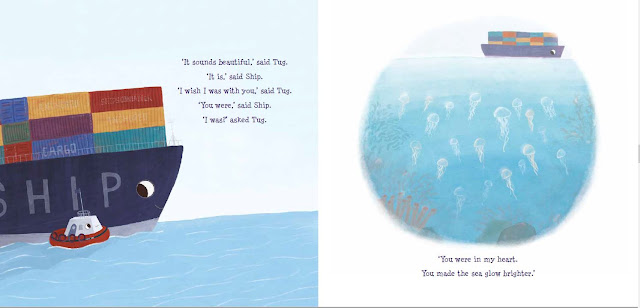Loving someone and knowing you are loved in return, can transform your outlook and how you live your life.
As parents, educators, or writers for children, we understand that children need the security of knowing they are loved and cared for. Attachment and bonding take place in the early years, and parents become the safe base for the child to feel secure in the world. Almost paradoxically, this attachment to parents is what allows children to sustain time away from them, knowing they have that safe base (an anchor!) from which to explore the world and return.
When my daughter was starting preschool, she wanted reassurance that I would miss her when we were apart, whilst simultaneously worrying that I would feel bad because I missed her!
In Anchored, Ship tells Tug how thinking of her when they
were apart made Ship’s days brighter, and made Ship feel braver and less alone.
It’s like we might feel when a sunset moves from being beautiful to sublime,
when watching it with the glow of love in our hearts. Or the super-human
bravery that parents exhibit in the face of their own fear, whilst protecting
their children: Huge huntsman on the bed? Never fear, Mummy’s here to the
rescue!! Maybe you can relate? My hope is that Anchored can be used to reassure
children that out of sight is not out of mind, and that thinking about their
child can make a parent’s (or loved one’s) day brighter.
This got me
wondering about how a child might feel if they saw the powerful impact that
loving them had on their parent’s experience of the world? Tug responds to
Ship’s experiences with pride, her ‘flag fluttered at the tippy-top of her
mast.’ Could Anchored help empower children, knowing that they are
important just for being who they are? They may be small but they have a big
emotional impact on their parents/loved ones: like a tugboat – small but
powerful.
Ship also models
a way of dealing with separation, with an attitude shift that Tug can emulate:
instead of being sad at the loss, be glad of the love. So next time Ship heads
out to sea, Tug’s flag ‘drooped a little when she waved goodbye,’ but she was
‘buoyed that even though she and Ship were oceans apart, they were anchored in
each other’s hearts.’
Sometimes it’s helpful for children to have an object they can look at to remember they are securely loved at those ‘missing you’ times, just like adults have objects like wedding rings. For me, as a child with my dad in Vietnam, it was a jewellery box that he brought home when he was on leave. In Anchored, Ship looks to the stars and imagines Tug in them. This demonstration of conjuring warm feelings of love hints at a strategy to provide comfort during times of separation. I hope Anchored can help equip children with strategies to manage the ‘missing you’ feelings.
One of my favourite books of the last few years was Love Stories by Trent Dalton, and this quote by his wife, Fi, jumped out at me: 'I know that love is the beginning and end of everything, at least of everything good… it’s the one true thing that keeps us putting one foot in front of the other, that keeps us trudging through the sometime-swamplands of our lives, and other times has us flying through the highest of blue skies.' (p.312)
I wanted Anchored to
capture this, in picture book form for children, and it turned out that a
tugboat and a container ship proved to be the perfect vehicles (pun intended!)
to explore these aspects – Anchored is my ode to love.
References:
Dalton, Trent, Love Stories, Fourth Estate, 2021
Debra Tidball is the award-winning author of picture books, as well as flash fiction, short stories, poems and plays which have been published in anthologies and The School Magazine. With a background in social work, she also has an MA in children's literature, and has a particular passion for picture books. Debra lives in Sydney where she writes, reviews books and blogs, with her Best Buddy, Archie the French Bulldog, always close by.
Connect with Debra via her website or Instagram

.JPG)


